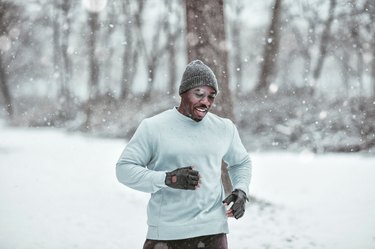
A hot, steamy shower to start or end the day is probably more relaxing than an ice-cold one. But what if a cold shower could help you lose weight?
It's a common belief that cold exposure can turn up the heat in your body and burn more calories. And it's true that you burn more calories in the cold (although that has its pros and cons). But do cold showers burn fat? We took this question to an expert to get to the bottom of it.
Video of the Day
Video of the Day
Temperature and Calorie Burning
The idea that exposure to cold helps you lose weight isn't new; it's been studied for several decades resulting in different findings.
In a November 2009 study in the British Journal of Sports Medicine, researchers described how less than five minutes of cold water immersion helped to boost metabolism. However, their sample size was small, and it's unclear just how much participants' metabolisms were affected.
In a January 2014 study in PLOS One, researchers examined cold exposure on mice and found that it doubled their metabolic rate and increased their appetite, but no weight loss was found. Because this study only involved rodents, though, it's impossible to translate the results to humans.
In a February 2014 study in Cell Metabolism, research shows that shivering causes hormonal changes that trigger the production of brown fat. Brown fat is a specific type of fat that is activated in response to cold temperatures, according to Harvard Medical School. The main function of brown fat is to produce heat to help maintain body temperature. It achieves that by burning calories.
According to the Cleveland Clinic, brown fat is more common in lean people than in those who have overweight and obesity. Increasing your brown fat levels might help with weight control by increasing your calorie burn throughout the day, but that's not guaranteed.
What we do know is that the average person burns more calories when they're cold and start to shiver, per the American Council on Exercise. Shivering is an attempt to generate body heat and maintain a healthy core temperature. As your body temperature slowly lowers, you enter a phase called "non-shivering thermogenesis," which can lead to increased calorie burn. As your temperature lowers even more, you'll start shivering to generate heat, which also burns calories.
But Do Cold Showers Help You Lose Weight?
Taking a cold shower sounds like an easy hack to burn fat, but it's not that simple when it comes to shedding pounds. Shivering from exposure to cold — such as in a long, cold shower — might help you burn more calories over time, but Sylvia Gonsahn-Bollie, MD, and founder of EmbraceYOU Weight & Wellness, says that shivering from cold temperatures is not enough to produce legitimate weight loss.
"There is no scientific merit or basis to this," she says.
There are also serious and even deadly risks from extended cold exposure, like hypothermia. Instead of a quick fix, weight loss should be achieved carefully with proper nutrition and regular exercise.
The definitive answer is no, cold showers do not burn fat or help you lose weight. While shivering does increase calorie burn, it's likely not enough to lead to measurable weight loss.
Risks of Cold Showers
Taking long cold showers is not only ineffective for weight loss, but it can also be dangerous, too. "It's so dangerous because of the risk of frostbite and damages to your extremities," Dr. Gonsahn-Bollie says. "There can be central damage to the skin like frostbite or hypothermia."
Hypothermia can happen in just a few minutes through exposure to icy water. Long, cold showers could make your body temperature dip to dangerously low levels. Hypothermia can slow your reflexes, cause muscle weakness and induce fatigue, per the Mayo Clinic. As body temperature continues to drop, hypothermia can lead to seizures, coma or even death, per Dr. Gonsahn-Bollie.
The bottom line is, it's not worth the risk to your safety just to burn a few calories.
A Safer Way to Lose Weight
The best way to lose weight is by making a safe and sustainable weight-loss plan.
"Some immediate things you can start to do at home would be prioritizing your nutrition," Dr. Gonsahn-Bollie says. She suggests cutting back on processed foods and refined sugar that can slow down your metabolism. Instead, fill your plate with whole foods like fruits, vegetables, whole grains such as brown rice and quinoa and lean protein like chicken and turkey.
It might also be a good idea to see a professional who can work with you toward your weight-loss goals. "Getting with an obesity medicine specialist would be helpful because they can take a deeper look at all the factors going on in your life," Dr. Gonsahn-Bollie says.
- American Council on Exercise: "Do I Burn More Calories When It Is Hot Outside or Cold?"
- Harvard Medical School: "New Obesity Tool?"
- Cleveland Clinic: "Brown Fat"
- Mayo Clinic: "Hypothermia"
- British Journal of Sports Medicine: "What Is The Biochemical and Physiological Rationale For Using Cold-Water Immersion in Sports Recovery? A Systematic Review"
- PLOS One: "Effect of Intermittent Cold Exposure on Brown Fat Activation, Obesity, and Energy Homeostasis in Mice"
- Cell Metabolism: "Irisin and FGF21 Are Cold-Induced Endocrine Activators of Brown Fat Function in Humans"


